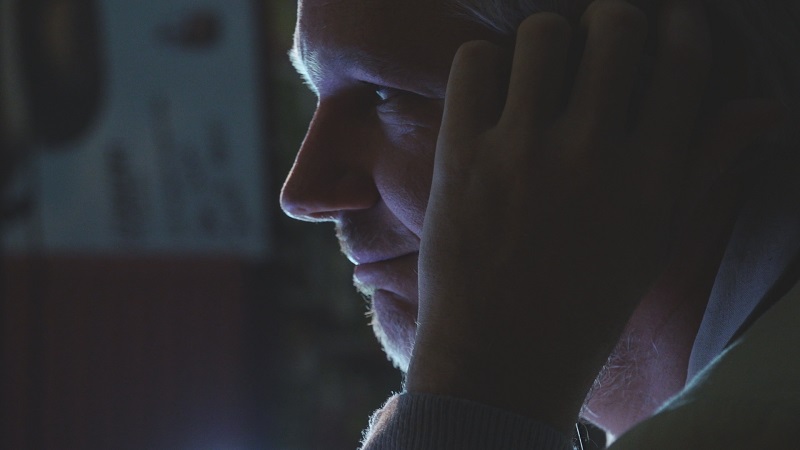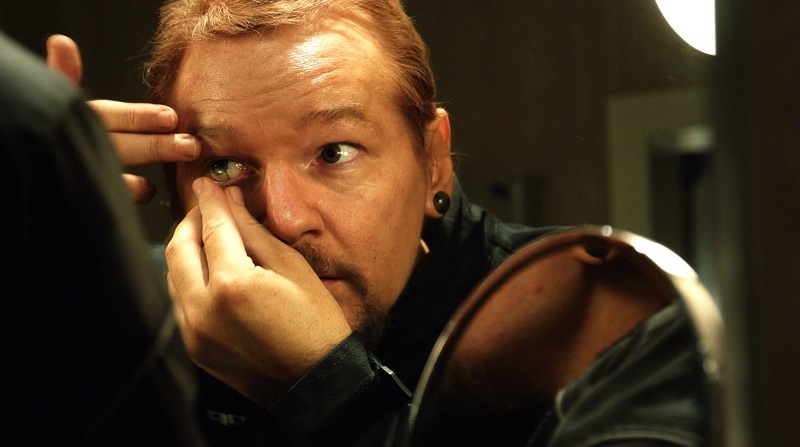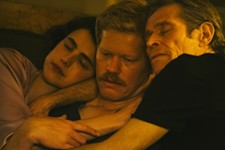Laura Poitras Takes a Risk
Oscar-winning documentarian on Julian Assange and WikiLeaks
By Richard Whittaker, 7:00AM, Tue. May 9, 2017

Laura Poitras is frustrated with technology. Wrangling a new phone, she contends with planned obsolescence. "I can't believe that they changed the mini-jack. It's highway robbery that they make you buy a new headset."
The pros and cons of technological advances, and how they shift power, are the subtext of Risk, the Oscar- and Polk-winning documentarian's profile of WikiLeaks founder Julian Assange. It serves as a counterpart to Poitras' 2014 Oscar-winning documentary Citizenfour – indeed, at various stages they were part of the same project – but it is different in form and conclusions. Where her study of Edward Snowden was mostly set in one hotel room in Hong Kong, she followed Assange for years, a chronicler privy to his inner circle and his most complex machinations.
Similarly, while Citizenfour has been challenged as being too supportive of Snowden's mission, Risk is not simply warts-and-all about Assange. The second release from Alamo Drafthouse head honcho Tim League's Neon shingle, it's a disturbingly intimate view of a man who has gone from being the poster child for hacktivism to an unaccountable global force, demanding Hillary Clinton return his calls and playing dress-up spy games. As Poitras says in a brief moment of commentary, “I thought I could ignore the contradictions. I thought they were not part of the story. I was so wrong."
It's also about Poitras' own complicated relationship with Assange and the WikiLeaks inner circle. While she remains behind the camera, she is a presence through narration of her own production diary, catching her increasing concerns about Assange, and her own shift from observer to participant. Not that she was eager to become her own subject. "I don't jump at the opportunity to put myself in my films. My editors will tell you, it's a big struggle to get me to do it."
It's a philosophical break from her normal approach to storytelling. "I believe in observational filmmaking," she said. "Just watching human relations, you learn a lot about people, more than if you did an interview, for instance, because people paint a picture of themselves which may be different from the one that you would see in action."
The first-person perspective was also a late addition to the film, which debuted in radically different form a year ago at Cannes. Poitras described her voiceover as "reflecting on things as I'm shooting, as I'm processing, and in a way to help the audience navigate the conflicting things that exist in this film. That sometimes you're on side with what you're watching, and other times the audience is really not."
The Assange she portrays is as divisive as Silk Road founder Ross Ulbricht: Seen by supporters as an online civil rights pioneer and a victim of the deep state, but to others a techno-Libertarian dude-bro, hellbent on reshaping society in their image. It's not just Assange, but key WikiLeak figures like Josh Appelbaum: facing down the Egyptian telecoms giants for complicity in dictatorship one moment, and then making a jaw-droppingly tone deaf analogy in a room full of female hackivists the next. Poitras said, "The tech scene, the hacker scene, is a really male dominated world, and I'm trying to raise some questions around the gender issues, and allegations of abuse and worse."
"I don't want to diminish in any way the bravery and commitment of anyone in the film," she said. "I think everyone in this film has put their freedom on the line. But I'm also not going to sugarcoat things I've seen."

Laura Poitras: It's different with every film. Sometimes, if you have a real plot line, like a trial, you have to follow through. This one was a little more amorphous in terms of where it felt like I should stop filming. It was also made complicated by the fact that I was deep into this film, and I was contacted by Edward Snowden. For a while, I thought it was part of the same film, and started editing, and then I went, "Oh, it's two films," and I started on just cutting the Snowden film.
I then didn't know if I would turn back to WikiLeaks, because the themes I was interested in when I began the project were surveillance and journalism, and it felt like Citizenfour captured those themes. Then I finished that, and it was just nagging at me. I just felt that Julian is such a significant figure in terms of the internet, and shifting power, and journalism, that I just couldn't not finish it.
So I came back to it, and then with what happened in the last year, and the elections, and WikiLeaks coming in the news so prominently, it was clear that I needed to include that.
AC: A lot of the film is about the changing perception of WikiLeaks, and in some ways your positions on it, and your approach. In that way, it was very personal, so what were the points where you thought, this isn't necessarily what I thought it was, this isn't necessarily the impact I thought it was going to have?
LP: It was more a continued belief in the mission, and then being more conflicted about Julian more personally. That happened while I was shooting, and it was in the first year of shooting that those were different things. I wasn't planning to go into questions of gender, and the allegations. I didn't say, "Let me make a film about extradition." That was not the film I was making. I thought I was making a film about journalism, and then it became part of the film, in addition to making a film about WikiLeaks publishing.
So it took on different layers while I was working, and then trying to make a film that contains both. That, at some point, you'll be seeing things that you think are potentially heroic or admirable, and then other things that are less so, or disturbing, and to have the film encompass all of that.AC: In the inner circle around Julian, there's almost a personality cult. He's clearly very charismatic, and at points clearly prepared to use that.
LP: I just think the people working with him are very strong-willed and risk-takers themselves, and independent. I don't think it's just what Julian says, but there is a collapse between the organization and him. It's hard to imagine the organization without him, his personality is so part of the organization.
AC: Julian does have this very carefully curated public persona, and you're very clear toward the end that he was not happy with aspects of what you were portraying. How do you think he sees his place in world politics, because he seems to have established himself as a non-state actor?
LP: A global player. I think those are different things. A non-state actor is shorthand oftentimes for what this government wants to criminalize, so I wouldn't say non-state actor. I would say he's a global figure on the world stage, in terms of power dynamics and the publishing he's done.
I'm not going to speak for him, but there's an interview where he talks about acting globally versus acting locally. He says this whole thing, that he was this expert in this new thing, the internet, that was changing world politics – for the better and the worse. You get democratization and the shift of power, and also the ability of governments to surveil, to interfere in other country's politics, as we've seen recently. There's a new level in which the internet is shifting power dynamics. So I think he's a technical expert, and also being an aggressive publisher, he does think he's acting on the world stage.
Risk is on release now. For review and screening information, visit our listings.
A note to readers: Bold and uncensored, The Austin Chronicle has been Austin’s independent news source for over 40 years, expressing the community’s political and environmental concerns and supporting its active cultural scene. Now more than ever, we need your support to continue supplying Austin with independent, free press. If real news is important to you, please consider making a donation of $5, $10 or whatever you can afford, to help keep our journalism on stands.
Richard Whittaker, July 23, 2018
Richard Whittaker, May 11, 2018
Michael King, March 19, 2014
June 27, 2024
June 28, 2024
Neon, Laura Poitras, Wikileaks, Julian Assange











